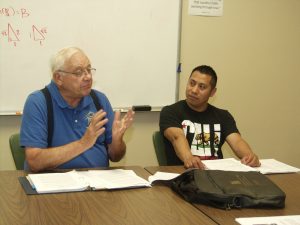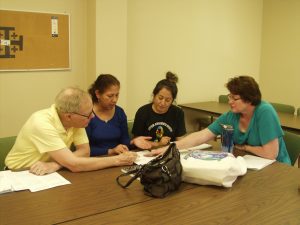Helping Latinos who are struggling with communication is one of Tom Stenklyft’s passions. The process brings him back to his roots. His grandparents emigrated from Sweden and in her later years as a widow, his grandmother lived with his family. He recalls her broken English and the difficulty she had with pronouncing the letter “j.”

As a member of the Retired and Senior Volunteer 55+ Program (RSVP), Stenklyft is a tutor and board member of Literacy Education Services, Inc. (LESI). He collaborated with Financial Information Service Center (FISC) to develop curriculum for a financial literacy class designed for Latino adults who are learning English.
Classes are held on Thursday nights at First United Methodist Church in Appleton, which provides free office and classroom space.
The curriculum focuses on the wise use of money and is divided into three parts: wise choices, good habits and the importance of being guided by a budget. The concepts are tied together with an ongoing story in the form of a light-hearted stage play. The students take turns being the characters and read the script. Tutors not only provide one-on-one help in pronunciation of English words, they reinforce good spending habits. Tutors talk about the importance of compiling a list before grocery shopping to prevent impulse buying; checking out books at the library instead of purchasing them; choosing low-cost transportation options like riding a bike, walking or taking the bus; and planning meals ahead to stretch their food budget.
“We make choices every day about what we spend every day,” Stenklyft said. “If we make less expensive choices we can save money.”
Stenklyft and his wife, Carol, walked into a Mexican restaurant in Appleton about 10 years ago and by the time they left, Tom had planted a seed that would change the life of its employees.

Carol asked a waiter a question about an item on the menu at El Azteca. The waiter couldn’t understand her, so he asked another member of the staff to assist. That exchange prompted Tom to speak with the manager, offering to teach his employees English at no cost.
Special arrangements were made with El Azteca to have Stenklyft teach its staff English on site.
“This was necessary because it is hard for restaurant employees to travel to class at our school,” he said. “They work long hours and many do not drive.”
This past year, he taught up to 13 students three days a week.
“All these students are friends,” he said. “In my mind, a tutor isn’t a teacher when dealing with adults. A tutor is a friend who tries to do his or her best to help the students they have. Of course we teach, but sometimes we deal with medical conditions, social relations or advise them to take a class at FVTC. I have made friendships in the Latino community that have been heartwarming.”
Stenklyft explains that the classes teach more than English. Students learn about the culture in northeast Wisconsin. Tutors take their students on tours of the community, visiting city parks and other attractions. They learn about the state’s logging and dairy industries and maple syrup season.
Linda Kilas, who has been tutoring since 1991 and is the president of the board of directors of LESI, said Stenklyft has done a great job.
“We asked him to join our board,” she said. “When I put an idea in his head, it expands. He takes on these challenges and really excels at what he does.”
Stenklyft also orients new volunteer tutors, raises funds for LESI through grass-root efforts and direct mail and coordinates five brat fry fundraisers for the agency.
He also spends time at the family cottage in Land O’ Lakes, visits family in Minnesota, Ohio and Michigan and has been taking an annual fishing trip to Minnesota with the same guys for the last 35 years.
He enjoys home winemaking, reading, vegetable gardening and participating in men’s Bible study.
Stenklyft says some people who retire make the mistake of going away from something. He offers retirees a prescription for happiness:
“When people are going to retire, you have to retire to something,” he said. “I’ve heard so many people say that they don’t want to do anything without getting paid. I tell them to look back over their working lives. What were the things that made you feel good? Why don’t you continue to do those good things in retirement? Don’t repeat the same things that gave you headaches on the job. Stick to the fun stuff – nobody has to get paid to have fun!”

